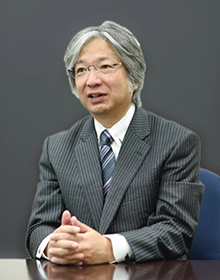Greeting

Director of Hydrogen Isotope
Research Center
Takayuki Abe
Since the beginning of the 20th century, rapid growth of industry and economy gave rise to accelerating consumption of fossil fuels such as coal, petroleum and natural gas, and now critical problems such as the green house effect and acid rain have appeared. These effects lead to a lack of water resources in the granary as well as a rise in the sea level owing to the temperature increase in the global environment, and cause a significant effect on the production of foods. Therefore, international cooperation will play an important role in solving such problems.
From this viewpoint, the interest in the Hydrogen Isotope Research Center (HRC) at the University of Toyama is focused on the attractive nature of hydrogen isotopes (protium, deuterium and tritium), and the basic research and application studies on efficient utilization of the functions of hydrogen isotopes are being carried out actively. Protium reacts with oxygen to yield thermal and/or electric energy without any emission of hazardous substances; the product of the reaction is only water, and protium can be contrarily produced by a simple reaction, the electrolysis of water. A sustainable energy system can be established by a resource cycle between protium and water. On the other hand, deuterium and tritium are the fuels of a thermonuclear fusion reactor of the first generation, which is widely recognized to become the main energy source in this century. Tritium is unavailable in nature but produced artificially from a nuclear reaction between lithium and thermal neutrons. Nevertheless, there is no shortage of deuterium because there is a plenty of deuterium in the sea in a chemical form of heavy water.
Hydrogen Energy System

Hydrogen isotopes are very promising as fuel resources to construct a new sustainable energy system, which will be built by a combination of a fusion reactor and the protium energy system. However, many issues must be solved in the future to apply this system to actual use. The goal of the research at HRC is the development of safe and efficient handling of hydrogen isotopes and material recycling in the new energy system. The members of HRC contribute also to the improvement in human resources in this field through graduate-course education.
